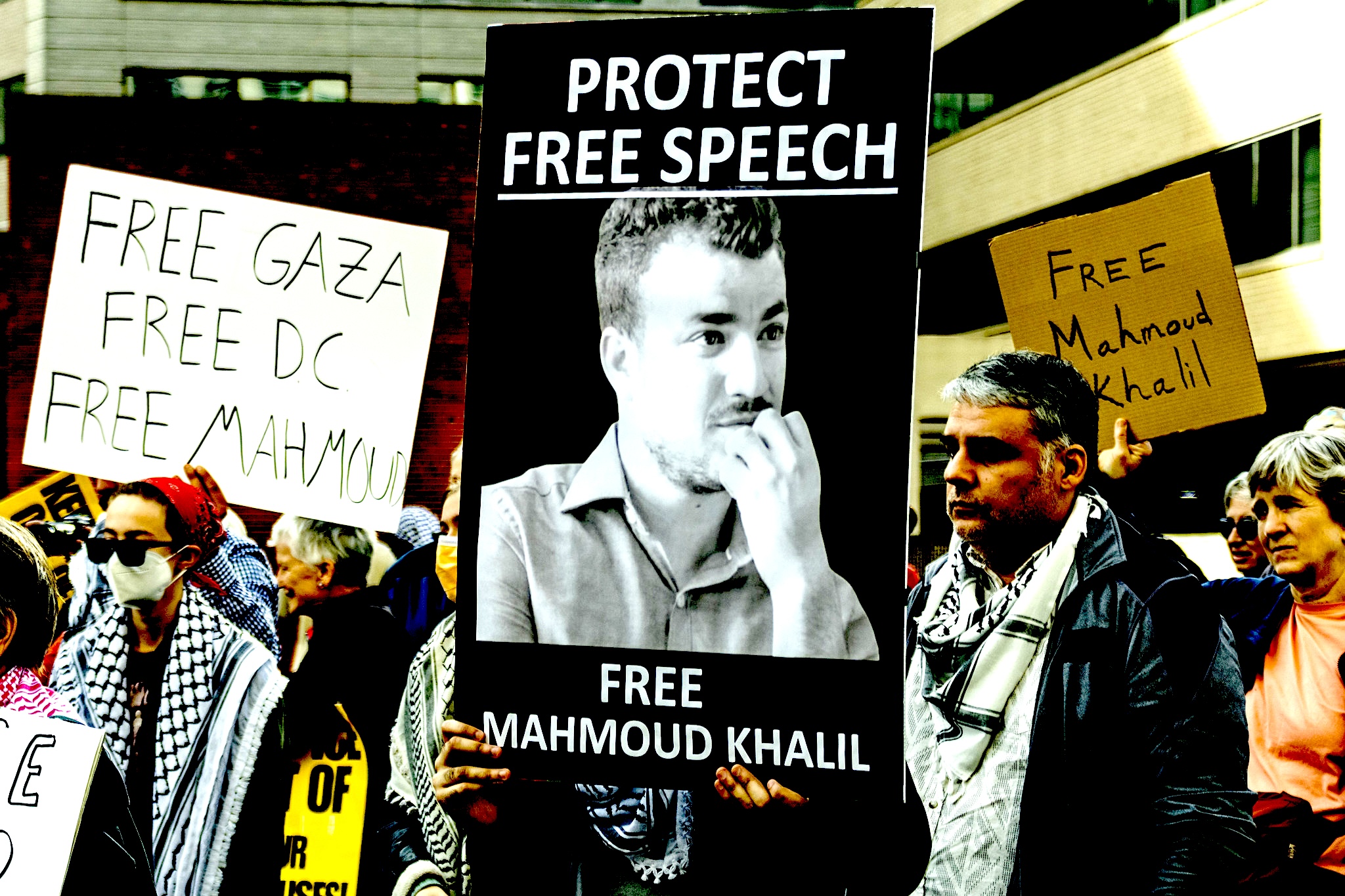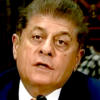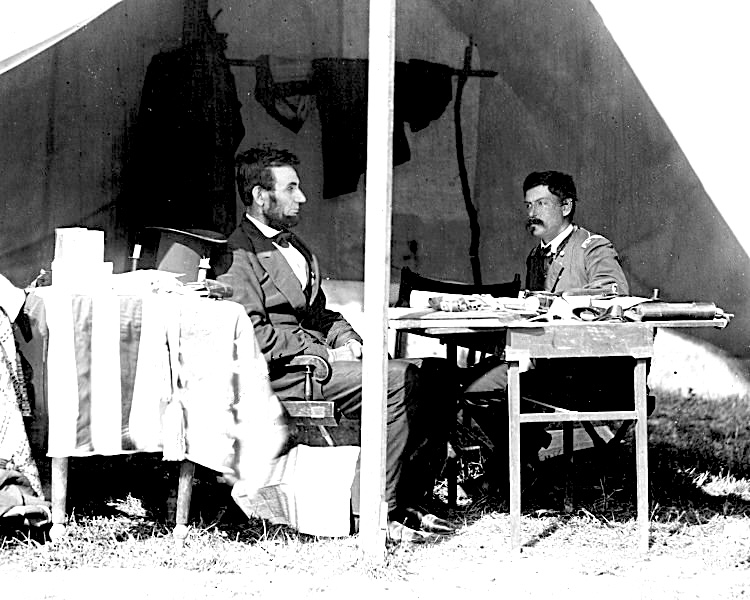The government’s respect for speech is often at its lowest ebb in wartime, when it is also most important and timely, writes Andrew P. Napolitano,

Demonstrators outside Immigration and Customs Enforcement headquarters in Washington, D.C., after agents seized pro-Palestine student activist Mahmoud Khalil. (Diane Krauthamer, Flickr, CC BY-NC-SA 2.0)
“I disagree with what you say but will defend to the death your right to say it.”
— Voltaire (1694-1778)
 When Thomas Jefferson wrote the Declaration of Independence, he included in it a list of the colonists’ grievances with the British government. Notably absent were any complaints about infringement upon speech.
When Thomas Jefferson wrote the Declaration of Independence, he included in it a list of the colonists’ grievances with the British government. Notably absent were any complaints about infringement upon speech.
In those days, speech was as acerbic as it is today. If words were aimed at Parliament, all words were lawful. If they were aimed directly and personally at the king — as Jefferson’s were in the Declaration — they constituted treason.
Needless to say, Jefferson and his 55 colleagues who signed the Declaration would all have been hanged for treasonous speech had the British prevailed.
Of course, the colonists won the war, and, six years afterward, the 13 states voluntarily ratified the Constitution. Two years after ratification, the Constitution was amended by adding the Bill of Rights.
James Madison, who drafted the Bill of Rights, insisted upon referring to speech as “the” freedom of speech, so as to emphasize that it preexisted the government. He believed the freedom of speech was one of the inalienable rights Jefferson wrote about in the Declaration.
Framers at Odds
Stated differently, each of the ratifiers of the Bill of Rights manifested in writing their unambiguous understanding that the freedom of speech is a natural right — personal to every human. It does not come from the government. It comes from within us. It cannot be taken away by legislation or executive command. It does not require a permission slip.
Yet, a mere seven years later, during the presidency of John Adams, Congress enacted the Alien and Sedition Acts, which punished speech critical of the government.
How could the same generation — in some cases, the same human beings — that prohibited congressional infringement upon speech have enacted a statute that punished speech?
To some of the framers — the Federalists, who wanted a leviathan central government as we have today — infringing upon the freedom of speech meant only silencing it before it was uttered. Today, this is called prior restraint, and the Supreme Court has essentially outlawed it.
To the anti-federalists — who believed the central government was a limited voluntary compact of states — the First Amendment prohibited Congress from interfering with or punishing any speech.
The Adams administration indicted, prosecuted and convicted anti-federalists — among them a congressman — for their critical speech.
When Jefferson won the presidency and the anti-federalists won control of Congress, the Federalists repealed three of the four Alien and Sedition Acts on the eve of their departure from congressional control, lest any be used against them.
Civil War & Cold War

President Abraham Lincoln and George B. McClellan in the general’s tent at Antietam, Maryland, Oct. 3, 1862. (Alexander Gardner/U.S. Library of Congress/Public domain)
During the Civil War, President Abraham Lincoln locked up hundreds of journalists in the North — including a congressman — who were critical of his war efforts. During World War I, President Woodrow Wilson arrested students for reading the Declaration of Independence aloud at draft offices or singing German beer hall songs.
Lincoln argued that preserving the Union was more important than preserving the First Amendment, and Wilson argued that the First Amendment only restrained Congress, not the president. Both arguments have since been rejected by the courts.
In the 1950s, the feds successfully prosecuted Cold War dissenters on the theory that their speech was dangerous and might have a tendency to violence. Some of the victims of this torturous rationale died in prison; two were executed.
The government’s respect for speech has waxed and waned. It is at its lowest ebb during wartime. Of course, dissent during wartime — which challenges the government’s use of lethal force — is often the most important and timely speech.
Modern Definition
It was not until 1969, in a case called Brandenburg v. Ohio, that the Supreme Court gave us a modern definition of the freedom of speech. Clarence Brandenburg harangued an Ohio crowd and urged them to march to Washington and take back the federal government from Blacks and Jews, whom he argued were in control. He was convicted in an Ohio state court of criminal syndicalism — the use of speech to arouse others to violence.
The Supreme Court unanimously reversed his conviction and held that all innocuous speech is absolutely protected, and all speech is innocuous when there is time for more speech to rebut it. The same Supreme Court had just ruled in New York Times Co. v. Sullivan that the whole purpose of the First Amendment is to encourage and protect open, wide, robust, even caustic, hateful and unbridled speech.
In both cases, the court recognized that the speech we love needs no protection; the speech we hate does; and the government has no business evaluating the content of speech.
Yet, in perilous times like the present, we have seen the government arrest folks and deport them because of their expressive activities — speech and assembling with those of like mind.
A New York City college student who is a permanent resident alien now sits in jail in Louisiana because he spoke out in favor of a Palestinian state — a position that has been the public policy of the U.S. since 1948. A Rhode Island medical school professor, also a permanent resident alien, was sent to her native Lebanon because she attended a funeral of which the feds did not approve.
Punishing speech and association is the most dangerous business because it is subjective and value-free and there will be no end to it. The remedy for hateful or threatening speech is more speech — speech that challenges the speaker.
Why do folks in government want to silence their opponents? They must fear an undermining of their power. The dissenters might make more appealing arguments than they do. St. Augustine taught that nearly all in government want to tell others how to live.
We have hired a government to protect our speech, not to tell us how to live. Instead, it does whatever will keep it in power.
Andrew P. Napolitano, a former judge of the Superior Court of New Jersey, was the senior judicial analyst at Fox News Channel and hosts the podcast “Judging Freedom.” Judge Napolitano has written seven books on the U.S. Constitution. The most recent is Suicide Pact: The Radical Expansion of Presidential Powers and the Lethal Threat to American Liberty. To learn more about Judge Andrew Napolitano, visit here.
Published by permission of the author.
COPYRIGHT 2025 ANDREW P. NAPOLITANO
DISTRIBUTED BY CREATORS.COM
The views expressed are solely those of the author and may or may not reflect those of Consortium News.

The phrase “the right of free speech” does not exist in the First Amendment. James Madison used the Virginia constitution’s “Declaration of Rights” as his model for his draft of the federal Bill of Rights. That document was silent on freedom of speech and of the press. But Madison could not have been unaware of the declaration of rights in Pennsylvania’s 1776 revised state constitution, in which we find the words “the people have a right to freedom of speech, and of writing, and of publishing, their sentiments; therefore the freedom of the press ought not to be restrained.” Madison simply omitted that all-important first clause, which would have upheld free speech as a natural or inalienable right of the citizens in the new republic.
Notice that, in contrast, in the next clause of the First Amendment, peaceful assembly and petitioning the government are defined specifically as rights of the citizenry. “Freedom of speech” is described simply as an activity only the National Legislature is forbidden to “abridge.” There is no prohibition of censorship by Executive Decree, so maybe we will soon see to what extent “original intent” is an actual factor to our current far right SCOTUS.
The effort has long been underway by libertarians and others to conflate the 1776 Declaration with the 1787 Constitution into a single entity, although they radically differ in content and purpose. One is promises made to incite rebellion against traditional, hereditary aristocracy, and the other is promises denied to enable a new aristocracy of self-made wealth.
Later court decisions included all government as being restrained by the First Amendment.
A Judges brief on the meaning of free speech
The fallacy of the so-called ‘free market’ in relation to the notion of the ‘freedom of speech’.
A libertarian is “an advocate or supporter of a political philosophy that advocates only minimal state intervention in the free market and the private lives of citizens.”
The insistent beatification today, of the Law, especially in the ‘more civilized’ 21st century, in the finery of all its historical garb, has no clothes!
It has always been a fairy tale of the 0.0001% minority, who have always been the ones to write and enforce the mythological narrative.
Like all else, “According to Plato, the sense of beauty is itself transient in nature. So, a thing beautiful for one might not be beautiful for the other.”
How can any state of mind be deemed both subjective, and value-free? If ever there was an oxymoron, this one is it.
No human speech is value free!
Nothing in human intercourse is actually “free from criteria imposed by subjective values or standards; purely objective.
We have hired a government to protect our speech, not to tell us how to live. Instead, it does whatever will keep it in power.”
Who are the ‘we’ who have hired a government? When has Politics ever before been regarded as a commodity for purchase, on a so-called free market? In this major endeavor alone, for all of humanity, there has never been a free market.
(Oxford Languages)
To find Liberty and Free Speech in America, one always need to get on a horse and ride westward to get away from the Elites. Always. But, we ran out of West. The East, place like New Jersey, were very good at telling people how to live and what they could say. The more people they got, the more power the elites got, the less freedom for Americans. So, for a couple of centuries, American citizens found some actual free speech and some actual liberty by getting on a horse and riding west.
Not surprising Shay’s Rebellion sprang from the farmers in Western Ma. The only thing they accomplished unfortunately was a section of an interstate road bearing their name not far from where I live.
The judge, like many Americans, completely mis-understands the nature of “The American Revolution”.
The American Revolution was a conflict of the Elite Class in America, who wanted to rule themselves without having to pay a ‘cut’ to the King on the other side of the ocean. This Elite Class knew they could not accomplish this without the people, so they spun a big fairy-tale about “the Tyranny of the King” and “Liberty” to convince a bunch of un-educated fools to fight and die so that the American Elites could rule over them without paying a cut to a ‘King’ across the water. The “American Revolution” was really another English Civil War with Elites fighting Elites for who was the gangboss.
Liberty was always a myth.
A few years after the poor people revolted against the King for making the Elites to pay a “tea tax”, the Elites, under now President George Washington, was sending out the troops to enforce Washington’s Whiskey Tax on people who dared to set up a still at home and were making liquor from the grain they grew.
It turns out it was some English Lads who captured the nature of the American Revolution …. “Meet the New Boss, Same as the Old Boss” Only if they’d have been pamphleteers back in the day, they’d have added some poetry about the wigs all growing more powder overnight.
Liberty was always a myth.
THE Myth of Liberty.
l guess from a young age we are all subject to Fairy Tales and their conditioning effect on young minds.
The old Jesuit credo ‘ give me the Child and ……………..you know the rest.
Its such a contradiction that that the world has never had more institutions of “higher learning” and less ability to think.
I believe that the nature of freedom of expression is even broader than Judge Napolitano indicates given that freedom of expression, which encompasses freedom of speech, freedom of the press and even freedom of assembly, to an extent, have their genesis in the rebellious jury of the Peter Zenger case in which it seemed possible at least that the utterances they found protected were libelous, something also present when the Supreme Court decided NYT v Sullivan, hence whether or not the information conveyed is accurate or not, it is protected as long as it is not knowingly or recklessly false, no matter how erroneous the opinion expressed.
We have witnessed how hypocritical politicians are regarding the First Amendment. The Trump supporters were railing against the Democrats’ use of censorship that went against them and rightly so. As soon as Trump took power they changed their tune and are now perfectly good with stifling free speech. No big surprise. Power corrupts. The Constitution and Bill of Rights are hanging by a thread.
There is so much to agree with in Judge Napolitano’s remarks, valuable in today’s context, that it is irksome to have to point out that there are in fact legal limits to free speech, notably regarding libel and incitement. The quote he attributes to Voltaire is something he never said (I refer to the French equivalent of course). In fact Voltaire set out once to punish a publisher (Grasset) whom he felt had libeled him.
If we don’t bear in mind the existence of some limits, firmly grounded in law, we are liable to be discredited, as people object that our view about exception-less free speech boils down to defending promulgation of views we agree with while suppressing those we disagree with.
I learned something important about Freedom as a college FreshPeople. I thought I was free to listen to my stereo. The rest of my dorm floor thought that they were free to sleep at 3 am.
The most important word in the famous statement of the Declaration of Independence is a little word of only 3 letters. A – L – L, It declares that ALL people have certain unalienable rights, that among these are Life, Liberty and the Pursuit of Happiness. All people have these rights.
Which means that all rights run up against other rights. Freedom is always a negotiation between your freedom and your neighbors freedom as each of you has to respect the other’s free rights. So, of course there are limits to free speech, even though I consider that yelling FIRE! in a crowded theater can be an act of heroism, provided it is done at the correct moment to warn and save lives.
This is of course ignored by the aggressive, bullying types who like to shout about THEIR Rights. And, it should be blindingly obvious to anyone who understands the English Language that a movement that shouts “Lock Them Up!” is not a Freedom movement. Freedom movements empty the prisons.
“The government’s respect for speech is often at its lowest ebb in wartime, when it is also most important and timely”…
The US is always at war.
Thank you, Judge.